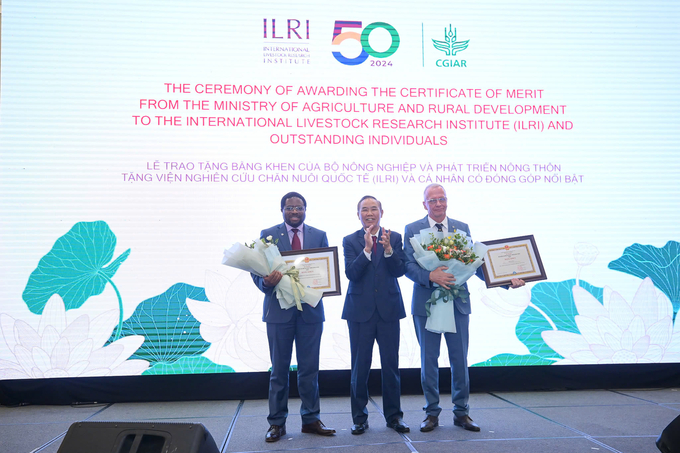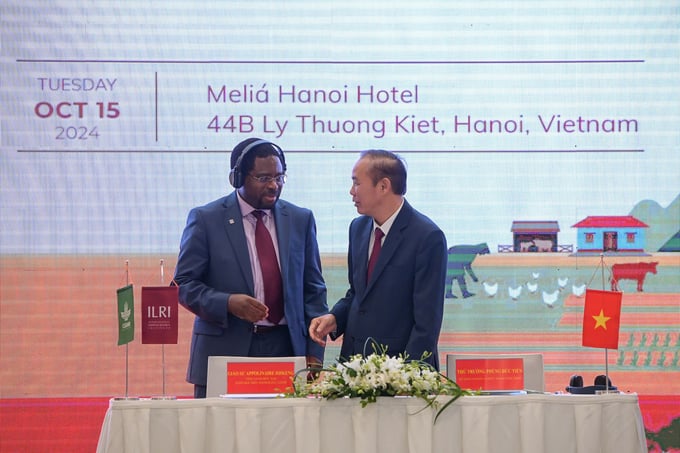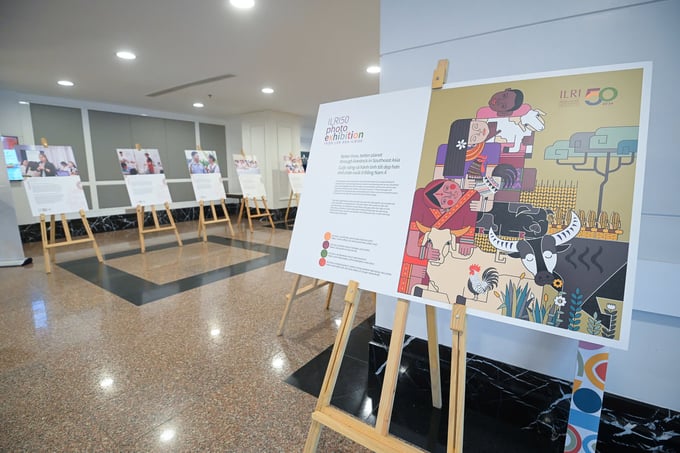June 19, 2025 | 04:07 GMT +7
June 19, 2025 | 04:07 GMT +7
Hotline: 0913.378.918
June 19, 2025 | 04:07 GMT +7
Hotline: 0913.378.918

Deputy Minister Phung Duc Tien presented the Certificate of Merit from the Minister of Agriculture and Rural Development to the leaders of ILRI. Photo: Tung Dinh.
“Unlocking sustainable livestock’s potential through research for better lives and a better planet," the new ILRI’s strategy targets to sets a goal to design and implement large-scale sustainable livestock solutions based on science, leveraging research to shape policy decisions and investments that have large-scale impacts within the livestock sector in target countries, including Vietnam.
Prof. Appolinaire Djikeng, Director General of ILRI, stated that Vietnam has played a strategic role in ILRI's efforts to enhance livestock systems, particularly in areas such as food safety, climate change resilience, and disease management. He also noted that Vietnam has shared the pioneership in several of ILRI's successes in the region.
Mr. Djikeng asserts that the new strategy intends to guarantee the sustainability and fairness of the livestock system, in addition to improving its output.
With the implementation of four research initiatives of the CGIAR, including the sustainable food system, animal health, food system transformation, and adaptation and mitigation of climate change, ILRI perceives significant opportunities to leverage Vietnam's robust research foundation to address emergent global challenges.
Nevertheless, the ILRI leader is of the opinion that it is crucial to acknowledge the diversified advantages that livestock provides to food systems and development, as well as the increasing demand for animal products, particularly in regions such as Africa and Asia, in the face of these changes.
"The transformation we are pursuing must be equitable and inclusive, enabling the livestock system to satisfy this demand without compromising its contributions to development," he stated.
ILRI aspires to establish more collaborative relationships, promote impactful research, and leverage the most advanced innovations by collaborating more closely with partners through this strategy. The strategy aims to transform food systems in the context of the climate crisis by providing sustainable livestock solutions that benefit over 300 million people worldwide, including farmers, producers, and consumers.

Deputy Minister Phung Duc Tien and ILRI Director General Appolinaire Djikeng. Photo: Tung Dinh.
ILRI has expanded its research portfolio, established a dedicated office in 2006, and collaborated with Vietnamese collaborators since 1999. Animal health, food safety, climate change adaptation, emergent diseases, enhanced livestock production, and value chains are the primary areas of focus for ILRI's regional office at present.
These initiatives contribute positively to the development of Vietnam's livestock industry and enhance scientific capacity in the face of international integration, increasing market demands, and technical and quality barriers for the import and export of livestock products.
At the same time, research on ecological health, One Health, and food safety has established the foundation for future breakthroughs. Vietnam has become a regional leader in livestock innovation and health as a result of these endeavors, which have also influenced our broader research agenda.
The International Livestock Research Institute (ILRI), a CGIAR institution, will commemorate its 50th anniversary in 2024. Therefore, the organization aspires to make a greater impact on the enhancement of livestock systems, with a particular emphasis on the management of diseases, climate resilience, and food safety.
Deputy Minister Phung Duc Tien stated that Vietnam issued a livestock development strategy for the period 2021-2030 in October 2020, with a vision to 2045, demonstrating a strong commitment from MARD. The Ministry of Agriculture and Rural Development (MARD) continued to recommend that the Government authorize five sector-specific initiatives related to livestock, including breed improvement, centralized slaughter, animal feed, and biotechnology, shortly thereafter.
Vietnamese agricultural sector leaders acknowledge that ILRI has made substantial contributions to Vietnam's livestock sector in four primary areas. ILRI initiatives have mitigated the risk of infectious diseases by enhancing control across the value chain in the context of food safety.
ILRI has enhanced productivity and adaptability in livestock genetics by conducting research on native varieties and providing assistance to small-scale producers. ILRI has improved the management of zoonotic diseases and increased awareness of the responsible use of antibiotics in animal health by implementing the One Health approach.

ILRI's photo exhibition on 50 years of operation and its milestones in Vietnam. Photo: Tung Dinh.
Furthermore, ILRI has advocated for sustainable livelihoods and climate resilience, assisting producers in vulnerable regions in reducing greenhouse gas emissions and implementing sustainable practices. These endeavors are consistent with Vietnam's objectives of poverty reduction, climate adaptation, and agricultural security.
"MARD is dedicated to fostering and broadening its collaboration with ILRI and domestic and international partners in order to achieve tangible results that promote the well-being of people, animals, and the environment, not only in Vietnam but on a global scale," the Deputy Minister underscored.
The Deputy Minister observed that ILRI has made a substantial contribution to the improvement of food security and the improvement of the livelihoods of individuals in Vietnam, particularly in mountainous, remote, and isolated regions, while reflecting on the organization's 50-year history of establishment and development. ILRI has selected Vietnam as its research and investment center in Southeast Asia, and MARD is privileged to serve as a traditional partner and accompany the organization.
Deputy Minister Phung Duc Tien is confident that ILRI will continue to make significant contributions to sustainable food systems, animal health, and climate change adaptation due to the organization's potential and assets in capacity development and applied scientific research.
Additionally, he observed that the percentage of household-scale livestock husbandry in Vietnam remains relatively high, at approximately 30-40%. Consequently, he anticipates that ILRI's research will continue to prioritize this group in addition to the advancement of large-scale farm-based livestock.
Deputy Minister Phung Duc Tien, on behalf of MARD, presented two Certificates of Merit to the International Livestock Research Institute (ILRI) and Dr. Fred Unger, ILRI Regional Representative for Asia, in recognition of their contributions to the development of rural agriculture over the past 25 years of cooperation.
Director of the Department of Animal Health, Nguyen Van Long, evaluated that the strategic objectives of ILRI are in close alignment with Vietnam's livestock development strategy.. "The sustainable development of Vietnam's livestock sector is promoted and resilience is enhanced by the collaboration of partners, organizations, and individuals with ILRI in the implementation of the strategy," he commented.
Translated by Linh Linh

(VAN) To address plastic pollution, closing the plastic recycling cycle will bring significant economic and environmental benefits.

(VAN) According to the Binh Thuan Department of Industry and Trade, in the first five months of 2025, Binh Thuan's dragon fruit export turnover increased by 20.65% compared to the same period last year.

(VAN) EU countries on Thursday gave final approval to new tariffs on fertilizer imports from Russia, a move aimed at cutting off revenue that could support Moscow’s war in Ukraine, despite concerns from European farmers.

(VAN) The working delegation from the Ministry of Agriculture and Environment conducted an important trip to the Netherlands to strengthen strategic partnerships and sustainable development in the agricultural sector.

(VAN) The letter ‘A Plea from the Ocean’ not only evokes emotion but also awakens the human conscience to the responsibility of protecting life on Earth.

(VAN) The Department of Agriculture in South Africa has announced the country’s first mass vaccination of poultry to prevent local birds from contracting avian influenza.

(VAN) Establishment of the Mekong Delta Regional Agricultural Linkage Center, aiming for a closed value chain, deep processing, trading platforms, and international market connectivity.